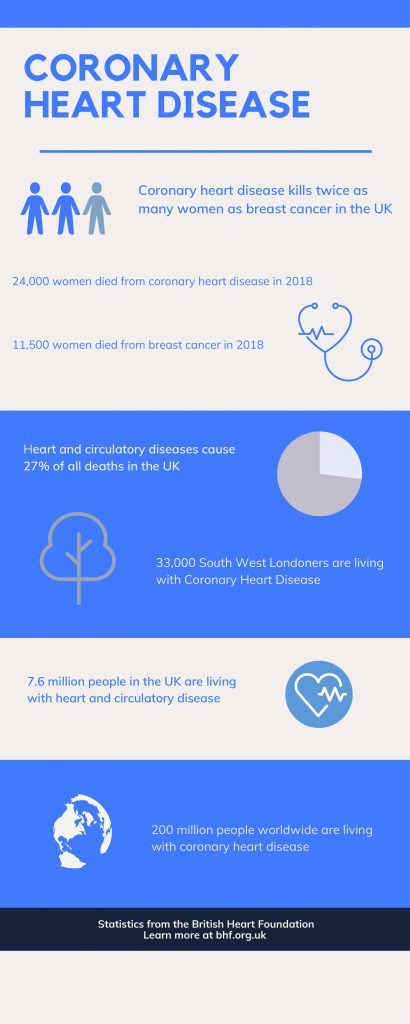Coronary heart disease (CHD) kills more than twice as many women in the UK as breast cancer, according to statistics by the British Heart Foundation.
Almost 24,000 women died from coronary heart disease in 2018 and 11,500 women died from breast cancer in the same year.
Barbara Casadei, British Heart Foundation Professor at the University of Oxford, believes there are many misconceptions about the illness.
She said: “We have done bad PR for cardiovascular disease.
“There is a sense that people think you deserve it because you have been eating the wrong food, unlike cancer which is considered monumental bad luck.
“This is completely wrong.”
Cardiovascular disease and cancer share many of the same risk factors including poor air quality, stress, family history, ethnicity, age or gender, as well as those more well-known such as diabetes, obesity and high cholesterol.
Around 7.6 million people in Britain are currently living with heart and circulatory disease today, which makes up twice the number of those living with cancer and Alzheimer’s disease combined.
In south west London alone, 33,000 people are living with coronary heart disease, the findings revealed.

Casadei believes there is a certain amount of complacency around the issue, and stresses the importance of not underestimating symptoms and keeping informed about the disease.
She said: “You can have a vulnerable plaque in a coronary artery that gives you no symptoms, particularly younger individuals, until it breaks and then you have a heart attack that may be fatal.
“Awareness does not increase by looking at the numbers. Unless you have someone you know or someone in the family who had cardiovascular disease, you think it’s never going to happen to you.”
The onset of the pandemic has put heart disease sufferers at further risk, as there has been a massive reduction in the number of people contacting their GPs about potential symptoms.
Casadei was alarmed to learn that NHS England saw a 40% reduction in the number of patients coming forward with symptoms in April 2020.
She estimates that thousands of patients missed out on acute treatment for heart disease, as many feared becoming infected with Covid-19 in hospital, leading to some even suffering heart attacks at home.
“This used to happen in the 70s but since then, we know exactly what to do with these patients”, she said.
“We could turn them around very rapidly and we can really save lives.
“It’s tragic that this opportunity has been missed.”
Infectious disease epidemics such as the flu have historically led to an increase in heart attacks, because inflammation increases the probability that a vulnerable plaque might rupture.
The pandemic dealt a further blow to the work of the British Heart Foundation, as it has lost 50% of its fundraising over the past year due to cancelled events and diminished corporate sponsorship.
Casadei added: “Covid-19 has been a disaster for charities.
“It’s very important to donate at this time.
“If we’re not careful, we really risk losing a generation of researchers and that would be very impactful.”
This lack of funding is likely to have long-term consequences for cardiovascular research as it will lead to fewer fellowships and opportunities for the next generation of scientists.
But in the meantime, Casadei believes there is plenty that individuals can be doing, from adopting healthy behavioural habits, to sharing knowledge and becoming familiar with CPR.
She said: “It’s about a lifelong pursuit of healthy living and being part of a group who are trying to prevent these preventable deaths.
“Everybody needs to be an advocate for cardiovascular disease.”





